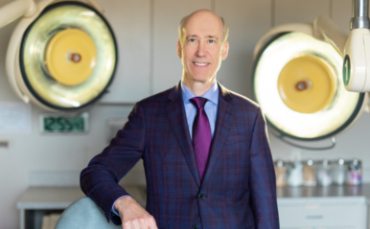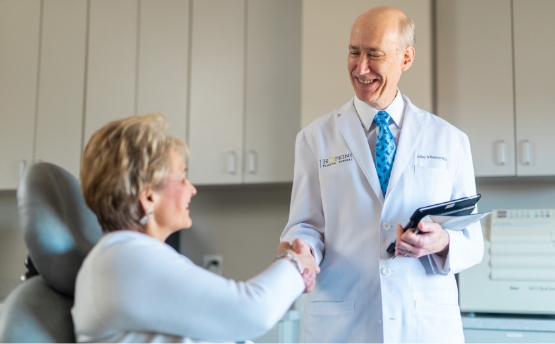 Each year, more than 60,000 men and women in the U.S. have breast reduction surgery. Many people want the surgery for cosmetic reasons. But excess breast tissue can cause pain, discomfort, and unwanted attention that you want to stop. If you are considering breast reduction surgery, a consultation with a board-certified plastic surgeon can help you decide if it is right for you.
Each year, more than 60,000 men and women in the U.S. have breast reduction surgery. Many people want the surgery for cosmetic reasons. But excess breast tissue can cause pain, discomfort, and unwanted attention that you want to stop. If you are considering breast reduction surgery, a consultation with a board-certified plastic surgeon can help you decide if it is right for you.
20 Questions to Ask During Your Breast Reduction Consultation
Although you will learn about breast reduction surgery during a consultation, you can make an even more informed decision about treatment if you are prepared to ask questions. How do you know what to ask?
We have put together a list of 20 to help you get started.
1. Are you board-certified in plastic surgery?
Board certification ensures your surgeon is trained and experienced in plastic surgery. Certification requires completing specific education and training and passing comprehensive written and oral examinations. When your plastic surgeon is board-certified, it can increase your confidence in their ability to thoroughly educate you about the process and successfully perform your surgery.
2. How much experience do you have in breast reduction surgery?
Not all board-certified plastic surgeons specialize in breast surgery. Ask your surgeon:
- How many years of experience do you have in breast reduction surgery?
- How many patient cases have you completed?
- How frequently do you perform breast reduction surgery?
Your goal is to be confident that your surgeon can reduce your breast size and shape your breasts to complement your body frame.
3. Where will you perform my surgery?
Plastic surgeons perform surgeries at one or more locations:
- The surgeon’s on-site surgical facility
- An outpatient surgery center
- A hospital
If you prefer the surgeon to perform your surgery at a hospital, ask for a list of hospitals where the surgeon has privileges to admit and treat patients. You will be discharged from the hospital on the same day as the surgery.
4. Am I a candidate for breast reduction surgery?
You may be a candidate for breast reduction surgery if:
- You are physically, mentally, and emotionally healthy
- Your breasts are too large for your body frame
- The weight of your breasts causes poor posture
- The weight of your breasts causes skin irritation or physical pain or discomfort, including neck, back, or shoulder pain
- Your breast size limits your physical activity
- You are self-conscious about your breast size, especially in public
- Your expectations are realistic about the outcome of breast reduction surgery
5. Can teenagers get breast reduction surgery?
Although a teenager might be a candidate for breast reduction surgery, breast development is not usually complete until about age 18—sometimes later. If a teenager has the surgery, it may need to be repeated if their breasts continue to grow. Your plastic surgeon will explain the pros and cons of breast reduction surgery during teenage years.
6. May I see before-and-after pictures of your patients?
Before-and-after pictures of the surgeon’s breast reduction patients will show you the kind of results you can expect. Ask to see pictures based on your gender—male or female. As you look at the pictures, the plastic surgeon should welcome any questions about your case.
7. How much can my breasts be reduced?
After an exam, a plastic surgeon will tell you how much breast tissue can be removed. Your surgeon must leave enough breast tissue to allow your skin and nipple to heal correctly. The surgeon will listen to your preferences and work with you for desirable and achievable results.
8. What technique will I need to reduce the size of my breasts?
A plastic surgeon will recommend treatment based on the cause of excess weight in your breasts. Treatment options include a breast lift, breast reduction, or liposuction. And the surgeon might use a combination of treatments.
- Breast lift – A breast lift removes excess skin to elevate your breasts and prevent sagging. A July 2014 study published by the American Society of Plastic surgeons shows that breast lifting can decrease bra size.
- Breast reduction surgery – During breast reduction surgery, your plastic surgeon will remove a significant amount of breast tissue to decrease the weight of your breasts. Your surgeon will also remove excess fatty tissue and skin.
- Liposuction – If fatty tissue is the cause of your breast size and you do not have a lot of excess skin, a surgeon might use liposuction for breast reduction. It is a shorter, less-invasive treatment option.
9. How can I prepare for breast reduction surgery?
Preparing for the procedure includes completing requests from your plastic surgeon and making a to-do list of personal tasks.
What your plastic surgeon may request:
- Take the medication the surgeon prescribes or adjust your current medication.
- Get lab tests or a medical exam.
- Get a current mammogram.
- Stop smoking at least six weeks before surgery and avoid smoking at least eight weeks after surgery.
- Avoid taking anti-inflammatory drugs, aspirin, and herbal supplements to prevent excessive bleeding.
What you can do:
- Arrange for a responsible adult to drive you to and from your surgery appointment. And ensure an adult is available to stay with you for the rest of the day and overnight.
- Consider your financial responsibility if your insurance offers limited or no coverage for the surgery.
- Arrange for time off from work, school, or other responsibilities, so you can recover and heal properly.
- Rearrange items at home that you regularly need and make them easy to access. You will have restrictions for reaching and lifting after surgery.
- Purchase and pick up post-surgery pain medication that your plastic surgeon prescribes. You will need it as the anesthesia wears off.
10. What happens during breast reduction surgery?
Breast reduction surgery includes the following steps:
- Anesthesia – You will receive general anesthesia to put you in a deep, sleep-like state and keep you comfortable throughout the procedure.
- Incisions – Before surgery, your plastic surgeon will determine which type of incision is best to reduce your breast size and achieve your goals. Your surgeon will make incisions around your areola (circular area of skin around the nipple) and vertically down the breast or horizontally around it.
- Tissue removal – Your plastic surgeon will remove excess skin, fatty tissue, and breast tissue. The surgery requires resizing the areola and repositioning your nipple.
- Closing the incisions – Your surgeon will close the incisions using sutures, tape, and adhesives and cover the surgical site and your chest with bandages.
11. How long does breast reduction surgery last?
Breast reduction surgery lasts an average of two to four hours. But you will be under anesthesia for about five hours. It is usually an outpatient procedure.
12. What happens immediately after surgery?
Immediately after breast reduction surgery, you can expect the following:
- You will be in recovery until the anesthesia wears off.
- In rare cases, your plastic surgeon might place drainage tubes to reduce swelling. Before you leave the facility, a staff member will ensure you know how to empty and reposition the tubes.
- You will not begin to feel pain until the anesthesia wears off, but your surgeon will ensure you know when to take medication to minimize the pain.
13. What are breast reduction surgery risks and complications?
Although serious risks and complications are rare, all surgeries have some risks. Your plastic surgeon will explain the risks based on your health history and the condition of your skin and breast tissue. Breast reduction surgery risks might include:
- Allergic reaction or sensitivity to surgical or suturing materials
- Anesthesia complications
- Bleeding (hematoma)
- Blood clots
- Deep vein blood clots and cardiac and pulmonary complications
- Fat necrosis (damaged or dead fatty tissue)
- Fluid accumulation
- Inability to breastfeed
- Infection
- Irregularities in breast shape
- Loss of breast or nipple sensation (temporary or permanent)
- Partial or total loss of areola or nipple
- Persistent pain
- Poor healing at the surgical sites
- Revisional surgery
- Loss of skin where the breast and incisions meet
- Skin discoloration
- Unfavorable scarring
14. What can I expect as I recover from breast reduction surgery?
As you recover from breast reduction surgery, you can expect:
- Pain – Take the medication exactly as directed to minimize pain throughout your recovery. Most of the pain will subside in a week after surgery.
- Discomfort – You will feel tenderness, stiffness, and soreness after surgery. The discomfort will gradually improve within two to three weeks.
- Swelling – Swelling gradually decreases over the next three to four months.
- Rest – Sleep on your back with your torso elevated.
- Healing – For four to six weeks, wear elastic bandages around your chest or a sports bra continuously to support your breasts and promote healing.
- Bruising, itching, or numbness – If you experience these symptoms, they will gradually decrease within a month. Minor signs and symptoms may last up to three months.
- Hygiene – Take sponge baths until your surgeon removes your stitches.
- Stitches – You will return to your plastic surgeon in one to two weeks to remove the stitches.
- Mobility – Walk and move around but avoid exercise or lifting more than five pounds for four to six weeks.
- Driving – Avoid driving for at least a week after surgery.
- Smoking – Avoid smoking for at least eight weeks because it restricts blood flow and interferes with healing.
- Follow-up visits – After your surgeon removes your stitches, you will have a follow-up appointment in about four weeks. Your future checkup appointment will be less frequent.
15. Will I have scars after surgery?
Most breast reduction scars look like an anchor or a keyhole but will fade gradually—and fade considerably within a year. Your plastic surgeon will explain how you can minimize scarring by avoiding sunlight and applying ointments or creams to the scars.
16. When can I return to work or school after breast reduction surgery?
You can return to work or school after breast reduction surgery in about four weeks if your healing is progressive. But if your job, education, or training requires physical exertion, you may need more recovery time at home.
17. When will I notice the results?
- Decrease in breast size – You will notice breast reduction results immediately. But it takes two to three months for swelling to subside.
- Reduced pain and discomfort – You will experience relief from neck and back pain and other discomforts.
- Increase in self-esteem – The physical improvements from your surgery will improve your self-esteem and be an emotional relief right away.
18. Are the results of breast reduction surgery permanent?
After breast reduction surgery, your breasts will stay the same size unless you become pregnant or gain a lot of weight. But aging, gravity, and hormonal changes can cause your breasts to sag eventually.
19. How much does breast reduction surgery cost?
According to the 2019 Plastic Surgery Statistics Report from the American Society of Plastic Surgery, the average cost of breast reduction surgery in the U.S. is about $5,500. But associated fees are not included in the estimate. Other estimates range from $8,000 – $11,000. Each patient’s case is unique, and your plastic surgeon will give you a treatment estimate based on your needs.
You will incur additional fees for:
- Anesthesia
- Hospital or surgical facility
- Medical tests
- Post-surgery garments
- Prescription medication
- Surgical supplies
20. Will my insurance pay for breast reduction surgery?
Many insurance companies provide some coverage for breast reduction surgery. Your plastic surgeon must submit documentation to your insurance company, including:
- Signs or symptoms of excess breast weight, including rashes, pain, and discomfort
- Photos of your breasts and your body profile
- The weight of breast tissue to be removed
Your insurance company will review your plastic surgeon’s documentation. And they will evaluate your surgery based on criteria that compares your breast volume with your height, weight, body surface, and body mass index (BMI). If your insurance company approves your claim, you will be responsible for copays or deductibles.
Get Your Questions Answered with a Breast Reduction Consultation
Jeffrey D. Hopkins, MD, of Dallas, TX, is certified by the American Board of Plastic Surgery. Dr. Hopkins is an active member of the American Society of Plastic Surgeons and the American Medical Association. Each year, he performs dozens of breast reduction surgeries.
If you live in the Dallas area, request a breast reduction consultation with Dr. Hopkins today. Otherwise, visit the American Society of Plastic Surgeon’s website to find a board-certified plastic surgeon in your area.









